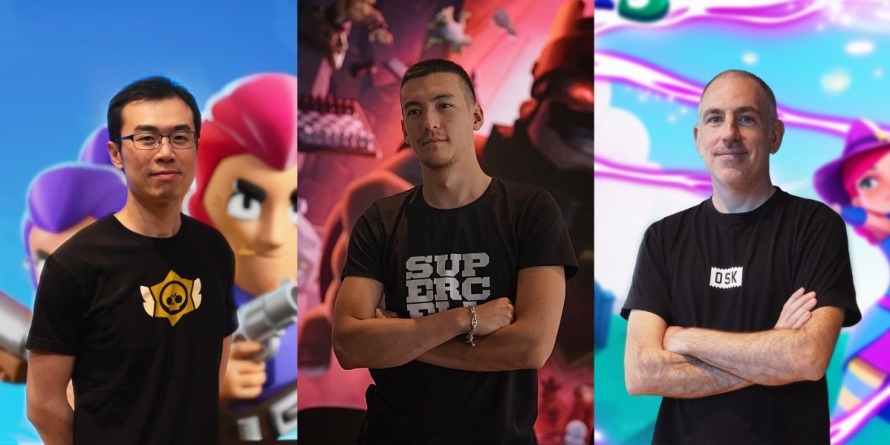Stay Informed
Get Industry News In Your Inbox…
Sign Up Today
“I believe IDFA is a positive turn for the industry as a whole because it forces game developers to refocus on creating games that are worth people’s time and attention.”
That’s not a widely shared sentiment across the industry, which was rocked by Apple’s privacy changes requiring users to opt-in to tracking. It shook the very foundations of the sector and has played a key role in a tough couple of years for the market.
But speaking to PocketGamer.biz, the CEO of developer Antihero Studios, Brice Laville Saint-Martin, takes a different view. Previously working as marketing creative direction and operation at Supercell, he’s formed a new start-up alongside former Brawl Stars senior game designer Frank Yan as CPO and ex-Bandai Namco Mobile software engineer and King senior technical director Andre Parodi as CTO.
The team’s vision is to “create games worth sharing” on mobile, with a focus on socially engaging multiplayer games. It’s already picked up pre-seed investment from Sisu Game Ventures and is preparing for its seed round.
A new vision
“Supercell has been an incredible place to work, as they’ve stayed focused on the right things over the years: creating great multiplayer games and memorable marketing, which are key to building a sustainable business in the post-IDFA era,” says Saint-Martin.
“However, when I looked at other companies and startups in the industry, I often felt they were focused on short-term business models, without an inspiring vision for the kind of company they wanted to build. As a whole, I felt we weren’t creating an inspiring future for our industry, players, or developers.”
On those IDFA changes, Saint-Martin explains that developers “are tired of making games constrained by what works as an ad”. He said they want to focus, instead, on making “great games worth playing”.
“Marketers are tired of creating questionable creative ads; they want to focus on producing great marketing worth remembering,” he adds. “Players do not want to engage with games that are not worth playing or remembering.
“Over time, these changes will encourage us to build an inspiring future for the mobile games industry.”
But with an industry largely built on user acquisition – finding the right players that will not only play a game, but the minority that will spend, too – how does Antihero plan to actually shake up how the sector has long successfully conducted its business?
“Marketers are tired of creating questionable creative ads; they want to focus on producing great marketing worth remembering.”
Brice Laville Saint-Martin
Saint-Martin says its “create games worth sharing” missing statement comes with two core pillars – socially engaging games with a word-of-mouth-worthy brand.
He states multiplayer games alone aren’t enough, however. He claims that, after talking with players and analysing data, a lot of players, particularly Gen Z, want deeply social games.
“We want to keep building on our expertise in creating some of the most recognised multiplayer games on mobile and take it to the next level, which we call ‘socially engaging’ multiplayer games in Gen Z’s favourite genres, on their favourite platform: mobile,” he explains.
“It’s quite a different game design philosophy, as we need to be able to give players time and space to create those meaningful bonds within fun and thrilling gameplay. For example, do players really have time to build meaningful connections within an intense one to three minute session?
“There are also well-studied psychological steps to real-life friendship formation that we are taking into account when designing our games. Even our matchmaking is impacted by this design thinking.
“Our goal is to build Antihero as the brand that represents ‘socially engaging’ games on mobile. The same way Nike has built a brand that represents ‘athletic gear’ in consumers’ minds, we want Antihero to represent ‘deeply social’ games in players’ minds.”
A lack of marketing innovation
Saint-Martin says that outside of the games industry, which also faces the same IDFA challenges and generational shifts, there is “so much more marketing innovation” than in gaming. He says while it’s no secret that everything starts with a good product, it also needs to stand out to the audience in an “inspiring way”.
He highlights examples like Nude Project, Liquid Death and Gentle Monster as brands that “break the rules” of their respective industries to stand out.
“They are the brands that matter, the brands that are part of culture, and that are ultimately remembered by consumers,” he states.
“Gaming and mobile gaming are one of Gen Alpha, Gen Z, and Millennials’ favourite topics/hobbies, yet the companies we’re building are not inspiring, and we miss a huge opportunity to build brand equity from one game to the next. I believe brand strategy is a blue ocean in mobile gaming, but only a few teams will be able to take advantage of it, and Antihero will be the first and most important one.
“By the way, this doesn’t mean that we are against performance marketing. We are not. What we are against is over-relying on it and not realising that if you want to drive business metrics, brand matters. Performance advertising only becomes more efficient the higher your brand awareness. More awareness equals higher conversion rate.
“This incredibly simple mission statement of ‘creating games worth sharing’ has incredibly big ambitions behind it. This statement is a guiding light for our teams to build both socially engaging games that you would want to share with your friends, and marketing that makes us word-of-mouth worthy and memorable in big ways.”
Additional reporting by Aaron Astle.

